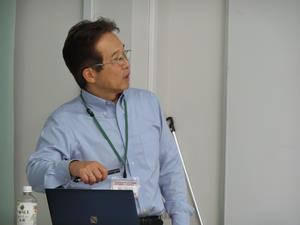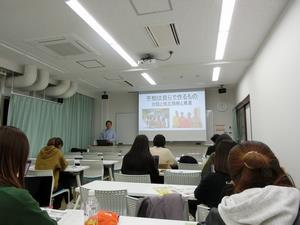- Global Collaboration Center
- Activity
- Report on 47th SDGs Seminar “Peacebuilding and Development: JICA’s Support for Peacebuilding in Mindanao” (December 4, 2024)
ページの本文です。
Report on 47th SDGs Seminar “Peacebuilding and Development: JICA’s Support for Peacebuilding in Mindanao” (December 4, 2024)
2025年2月14日更新
On Wednesday, December 4, the 47th Sustainable Development Goals (SDGs) Seminar titled “Peacebuilding and Development: JICA’s Support for Peacebuilding in Mindanao” was held. Mr. Naoyuki Ochiai from the Japan International Cooperation Agency (JICA) delivered a lecture. He provided detailed insights into JICA’s role and the concept of “human security” in the peacebuilding efforts addressing the conflict that has persisted for more than half a century in Mindanao, an island located in the southern part of the Philippines, where he has been actively involved for many years.
At the beginning, Mr. Ochiai mentioned that the probability of conflict recurrence after a peace agreement is signed is 43.6%. It is surprising to know that the probability of a conflict recurring is nearly one out of two. This made me aware of the importance of preventing conflict recurrence within the economic and social framework of international peace cooperation, in which JICA is involved.
Mr. Ochiai told us that the principle of “Do No Harm” is one of the most important aspects of JICA’s peacebuilding activities. For me, the idea of avoiding prejudice against any specific ethnic group or organization was very impressive. Unlike development cooperation in peacetime, the fact that actions, even when motivated by good intentions, can be perceived as biased against one group or another highlights the challenges of peace cooperation.
In the seminar, I was particularly impressed by the story of disarmament in the Mindanao peace process. Due to the strong relationship between soldiers and their weapons, the destruction of weapons is often perceived as the destruction of a part of themselves. The method of storing the weapons in containers rather than destroying them was intriguing. Although this method was more time-consuming than outright destruction, I believe that the peace process, which also takes into account the mentality of the local soldiers, may have contributed to preventing the recurrence of conflict, albeit gradually.
At the end of the seminar, Mr. Ochiai introduced the story of a man who lost his right arm as a result of a family feud. Even though the man had been a victim himself, he believed that the “hit back” mentality would not resolve the situation. With the idea of “not hitting back,” he has tried to reconcile the situation by establishing a community center and working together in an agricultural cooperative. I found hope in the increasing number of people who are working towards improving society, ensuring that the next generation will not be affected by conflict, even if they themselves are victims. I realized the importance of providing a place and opportunities for dialogue from a third-party perspective, including organizations like JICA, to help the people of Mindanao promote peace through dialogue.
In the seminar, I gained valuable insights into peacebuilding through JICA’s support in Mindanao by listening to Mr. Ochiai’s experiences on the frontlines, including specific episodes. Thank you very much for the informative lecture.
(Mizuki Saito, sophomore student, Global Studies for Intercultural Cooperation course, Department of Languages and Culture, Faculty of Letters and Education)
【Related links】
・Human Security in Mindanao, the Philippines, Advocated by Former JICA President Ogata Sadako(Youtube)
・Naoyuki Ochiai (2020) "Peace and Development in Mindanao, Republic of the Philippines—The Long Road to Peace through Trust"
・JICA Global Agenda "Peacebuilding"












